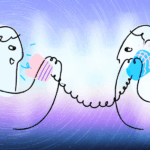
Eric Harmon
Eric Harmon is the senior pastor at New Hope Worship Center, a Free Methodist church in Charleston, Illinois. He and his wife, Jami, planted New Hope Worship Center in the spring of 2016. Prior to Eric being a senior pastor, Eric and Jami were youth directors at the Robinson Free Methodist Church in Robinson, Illinois.
by Eric Harmon
More than 17 years, that is the amount of time I have been free — free from a sin and a bondage that the church feels odd talking about. While we focus on the “big sins,” we often avoid the sins and struggles that plague the church. Maybe it’s because it hits too close to home, maybe it’s because we don’t want to upset our attendance, maybe it’s because we are not sure how to guide someone through the addiction. We must put a name on it, we must pull it from the darkness and into the light. It’s the addiction to pornography.
Research by the Barna Group and Covenant Eyes shows that 68% of churchgoing men view pornography on a regular basis and 87% of Christian women admit to having watched porn. More startling, is the fact that 50% of pastors struggle in secret with this bondage of addiction. (Visit fmchr.ch/conquer to read more statistics about how pornography affects society and the church.)
I have found that, in my own life, being transparent is the only way to truly find the power to break free. As long as the sin lives in the dark, it continues to grow and gain strength. It’s when we bring it into the light and confess our shortcomings, sins and struggles that the power of Christ is truly set loose in our lives. Scripture tells us in 1 Peter 2:9, “But you are a chosen people, a royal priesthood, a holy nation, God’s special possession, that you may declare the praises of him who called you out of darkness into his wonderful light.” God has called us out of the darkness of sin and into the light of His glorious love, forgiveness, grace and mercy.
What if the church took seriously the call in James 5:16 to “confess your sins to each other”? What if there was a vulnerability that each believer accepted? What if we prayed for, encouraged and loved each other even through failure?
A Place of Masks
I have attended church in many different denominations throughout my life. I was baptized as a baby in a Nazarene church and spent my younger childhood in a Church of Christ. As a teenager, I bounced between Assembly of God and Church of God. As a college student, I attended a Catholic church. Finally, as adults, my wife and I were led to the Free Methodist Church. Through much of my experience with the church, I found one thing in common: The church has been a place of masks with people pausing before coming into church to adjust their external looks while masking their internal struggles.
We’ve all been asked by a greeter, “How are you?” Our responses are preprogrammed: “Doing fine, thanks” or “Great, how are you?” or something of the sort, but often our response isn’t true. Maybe we wear our masks because we think no one would care to know the truth, or the truth would be too embarrassing, or we’ve become comfortable in the dark and we fear what the light might bring.
Brutal Honesty
For five and a half years, my wife and I served as youth directors at the Robinson Free Methodist Church. During our time there, we experienced a brutal honesty taking shape in the youth group — not one of prideful sin, or flaunting our shortcomings, but a brutal honesty that accepts the truth of where we are and what we are struggling with. The youth would gather around one another at the altar, laying on hands, and praying for true freedom. There was no judgment, no gossip, no ridicule. No one looked down on the other, belittled one another, or held grudges. Isn’t this the church that Christ desires?
If the church really wants to see people set free, then we must make our places of worship places of genuine transparency, wrapped in unconditional love, with Spirit-filled grace and mercy. We’ve heard it said, “Love the sinner and hate the sin.” I’m not sure this statement is what Christ had in mind for His church. I believe we should love the sinner, teach the sinner, be patient and forgiving with the sinner. Instead of us hating people’s sin, we should teach them to hate their sin, and we should learn to detest our own.
How to Stay Free
Once we are free from our addiction, how do we stay free? I have found in my life that living by a system of “guardrails” has brought the most success. You see guardrails exist to keep someone from traveling off course in dangerous and sometimes deadly areas. The guardrails assist us in reaching our destination. Once I was free from the addiction of pornography, I did not want to go back, so I set up extreme guardrails. My wife and I canceled all access to the internet (I know, now you must really think I’ve lost it). I became accountable to my spouse for every minute of every day, and we parental-locked our TV. These guardrails are why we are still happily married for more than 18 years. To this day, we still do not have internet. We do not have Facebook. We do not have Twitter. We still have our TV service parental-locked, and we are still using flip phones.
Now I’m not saying that everyone has to do what I did, but I challenge you not to give the devil a foothold in any area of your life, no matter what it takes. Freedom is worth any sacrifices we must make.
What do we do as the church? As the church, we need to begin to focus on being the light in the darkness instead of being appalled by the darkness. We must focus on showing the true love of Jesus Christ and steer clear of being the judge and jury of sin. Those who battle addiction don’t need another person or group looking down on them. They need someone to love them, teach them, and be real with them. The truth is that transparency brings transformation, and Jesus is in the transformation business. Let’s become transparent.+

Eric Harmon
Eric Harmon is the senior pastor at New Hope Worship Center, a Free Methodist church in Charleston, Illinois. He and his wife, Jami, planted New Hope Worship Center in the spring of 2016. Prior to Eric being a senior pastor, Eric and Jami were youth directors at the Robinson Free Methodist Church in Robinson, Illinois.









